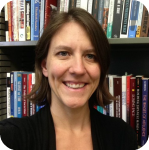Kristin Vekasi Researches Second Book at Harvard's Weatherhead Institute
Kristin Vekasi, Associate Professor of Political Science and School of Policy and International Affairs.
 I have been fortunate enough to spend my 2021-22 sabbatical year at Harvard University. I am using my position as academic associate with the Weatherhead Institute’s US-Japan Program to advance my research for my second book.
I have been fortunate enough to spend my 2021-22 sabbatical year at Harvard University. I am using my position as academic associate with the Weatherhead Institute’s US-Japan Program to advance my research for my second book.
My first book explored how Japanese multinational corporations mitigate political risk in China, particularly when geopolitical tensions spilled over into the business realm. Since its publication in 2019, the ways that geopolitics, patriotism, and international business intersect have only multiplied and become more difficult to manage, for politicians, businesses, and consumers alike. Beyond the US-China trade war, the pandemic starkly revealed some of the fragilities and over-dependencies in foreign supply chain for medical technologies and components like semiconductors.
My current research examines how China, Japan, and the United States cooperate and compete to manage complex supply chains. I focus on industries essential for the transition to green energy such as critical minerals and electric vehicles. From raw materials to component manufacturing to infrastructure and logistics, China, Japan, and the United States share similar challenges and could benefit from economic and technological cooperation, but are also fiercely competing for market share and national power. Some of my early research for this project on the geoeconomics of critical rare earth minerals was published last fall by the Georgetown Journal of International Affairs. In that piece, I compare Chinese, Japanese, and American industrial policy towards rare earths, which are used in most contemporary electronic gadgets, and indicate some lessons for the United States from China and Japan to build a more resilient sector.
I am excited to bring back my new research, as well as new connections and insights from Harvard scholars and fellows, to the political science department this fall.
